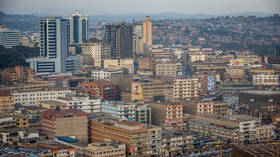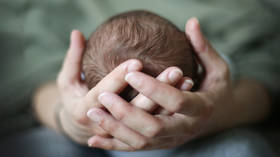Bomb rocks Russia’s south
Seventeen people have been killed and nearly 180 injured as a powerful car bomb attack hit the central market in the city of Vladikavkaz, the capital of the republic of North Ossetia.
Friday, September 10 has been declared a day of mourning in the region. On Saturday, 11 funerals were held for victims of the blast in the city of Vladikavkaz and surrounding areas. Authorities have paid for the transportation of bodies to Georgia, Armenia and Ukraine.
The youngest victim was only 18 months old. The boy died in hospital.
Seven children were among those taken to a local hospital.
The deputy health minister of North Ossetia, Taimuraz Revazov, said that “many of those hospitalized are in a serious condition. They have suffered greatly from the shrapnel that the explosive device contained.”
Some 150 local people have donated their blood to help the injured and more are expected to come.
The Russian government has promised compensation for the families of the deceased victims, valued at around $30,000 each, and those seriously injured in the blast, over $10,000.
A plane with aid and medical help sent by Russia's Emergencies Ministry arrived at the scene. The aircraft has taken the 11 most seriously injured victims to Moscow hospitals. Three more were transferred to Moscow later, and another three sufferers will be sent to the capital on Saturday.
The doctors who have been accompanying the transported people report that the majority of victims have superficial injuries.
“Many of those near the epicenter of the explosion have been killed. Those seriously injured have been taken to Moscow hospitals. There’s a child in a coma, suffering concussion and fragmentation wounds. He has been transported to children’s hospital along with his mother,” said Aleksey Salnikov, an Emergencies Ministry doctor.
RT spoke to aid Ruvshan Mamedov, the father of the child, who has also been brought to Moscow.
“I went into a shop as my mother, wife and sons remained outside,” he said. “And then an explosion. I rushed out and saw all four of them on the ground. I lost two of them. My son who died was one-and-a-half years old. My three-year-old son is now in surgery. Doctors are fighting for his life. There were many people in the market. It was terrifying.”
A second plane of the same capacity is preparing to take off for Vladikavkaz.
Reports say the explosion was so powerful that it damaged nearby buildings. Preliminary reports suggest that the bomb's force was equivalent to around 40 kilos of TNT.
Watch witnesses' accounts of the incident
Police say another bomb has been found at the gates of the market, and the area has been evacuated.Investigation underway
Three suspects have been captured in connection to the blast, Russia’s Federal Security Service reported later Thursday.
Earlier President Medvedev has had a meeting with security ministers to discuss the attack, and has given his orders on investigating the case.
"I would first of all like to say to all the people of North Ossetia that we are mourning the victims, innocent victims of this terrible tragedy," President Medvedev said.
"Our first priority is to give medical help to those who are injured in Vladikavkaz, Moscow or elsewhere it is needed and to offer moral and financial support to victims and their families," Dmitry Medvedev added.
Investigators are treating the attack as terrorism.
“The Ministry of Internal Affairs, as well as the FSB, are currently identifying those involved in the blast,” head of the republic of North Ossetia Taimuraz Mamsurov told a press conference following the attack. “We need to use the most severe measures to eliminate these monsters.”
The case will now fall under the control of Russia’s chief prosecutor, Yury Chaika.
It is believed that the explosive device was detonated by a suicide bomber. A decapitated body was recovered from the car at the center of the explosion. The owner of the car used for the attack has been detained and is being interrogated, Interfax news agency says.
He claims that on the eve of the tragedy he sold it to an unknown man.
A source in the North Caucasus Federal District law enforcement has said that half an hour before the blast, the driver of the car produced his ID at a checkpoint when entering the republic, though it is possible that the document was fake.
It's not the first time Vladikavkaz have been targeted by terrorists. The last attack in 2008 claimed the lives of 12 people.
Thursday's incident comes months after two deadly blasts in the Moscow Metro stations. The explosion in North Ossetia prompted police to strengthen security in the capital.
Local infighting or part of global terrorist network plan?
Hopefully, security forces will be vigilant and will prevent a new blast from happening – at least in the next few days [during the Global Policy Forum], said political analyst Dmitry Babich.
“North Ossetia has been a target for terrorist attacks for a long time. I would like to remind you, that Shamil Basayev, when he was alive, called North Ossetia ‘a Russian garrison in the North Caucasus,’ because Ossetian are the only ethnic group in the North Caucasus – besides Russians – which is predominantly Orthodox Christian. Vladikavkaz, and especially its markets, were very often victims of the terrorist attacks,” Babich told RT.
The central market in Vladikavkaz is one of the busiest areas in the city. It has already suffered two terrorist attacks in the past: one in 1999, which killed more than 50 people, and another in 2008, which left 12 more dead.
Matthew Clements, a terrorism expert with Jane's defense group in London, says the blast in Vladikavkaz is most likely a specific attack against Russia, not part of the wider global terrorist movement.
“The Caucasus insurgents known as the Caucasus Emirate, is a very much localized militant operation, the targets almost entirely based within the North Caucasus itself,” he said.
Sergey Arutyunov, Head of Caucasus department at Institute of Ethnology and anthropology with Russia’s Academy of Science agrees, saying today's attack is not an isolated incident, but part of a concerted campaign of terror in the North Caucasus.
“These tragic events have an ominous frequency. It’s not the first time the blast occurred on the same market. So we may suggest that’s hardly an accident but rather a trend,” Arutyunov told RT.
But security analyst Aleksandr Selivanov says the militants behind the attack are linked to Al-Qaeda and aim to take a hold on the region.
“There aim is to destabilize the situation in North Caucasus and Central Asia. They are trying to boost their sphere of influence, that’s first of all,” he said.
Selivanov's words were echoed by the US State Department later in the day. The counter-terrorism coordinator at the department also said the United States is willing to help Russia in its fight against terrorism in the region.
According to Democratic Strategist Chris Lapetina, the move is based on strong sympathy with Russians from the US citizens.
“The tragedies that Russia has experienced, especially the Beslan tragedy of 2004, have resonated with the American people. Both the leadership and the citizens of the US realize that in today’s world – 20 years since the end of Cold War – the US and Russia have more in common than separates us,” Lapetina told RT.
Many facts indicate that the terrorists who operate in the Northern Caucasus have direct financial, technical and ideological connections with the groups that are close to Al-Qaeda and to other terrorist groups in the Middle East, says Igor Zevelev, head of the Moscow bureau of the MacArthur Foundation. He added that it is always a combination of homegrown terrorism and international networks, and the North Caucasus is no exception.
“We know that the modern terrorists act as part of networks and in many cases there’s no centralized structure, but just a network of isolated trained groups. And this is one of the main difficulties in combating modern terrorism,” Zevelev said. “This particular event may or may not be linked directly to other terrorist attacks but from a political point of view, this certainly is a part of a big picture. The big picture is an attempt to destabilize the whole region, an important part of the Russian Federation, to incite ethnic hatred – in this particular case, between Ossetians and Ingush.”
“It’s very difficult to combat such kind of terrorism,” he concluded.
The terrorists behind the attack had a bigger agenda than just wreaking havoc among the people and possibly had external support, political expert and editor-in-chief of the analytical Slovo magazine, Viktor Linnik says.
“What we are dealing with here, I think, is a sustained and determined effort on the part of some to create political instability on the eve of presidential and parliamentary elections to which Russia is moving fast. I think it’s impossible to carry this out without money and assistance from outside Russia,” Linnik told RT.
Political scientist Dr. Walid Phares also believes that the bombing in the southern Russian city of Vladikavkaz is a part of a worldwide terrorist war against democracy.
“This suicide attack is not just a local one, by local terrorists it is considered internationally, including here in America, as a Jihadist terror attack against democracy in Russia as a whole. And beyond that, as we see around the world, wherever we see suicide bombers, you see a threat to democracy and freedom,” Phares told RT.
The latest attack comes just a month after Russia’s much-talked-about operation against militants in the North Caucasus, where some 40 were killed.
The blast looks like an act of retaliation and skeptics say the more militants are killed, the more are born. Andrey Murtazin of RIA Novosti news agency says the terrorists want to discredit the current political leaders in the Caucasus region – and have vengeance in mind.
“I think terrorists want to take revenge for the Beslan school siege. During this year's commemoration events, the security forces were on high alert, so no terrorist acts were carried out. Now [that] security measures have been slightly weakened, the terrorists attacked people,” Murtazin told RT.
“The terrorists [who] blew-up the car just want to destabilize the situation in the North Caucasus and discredit the current leaders in the area. They want to show that the state's authorities are failing to provide stability in the region,” he maintains.
However, Viktor Kamyshanov, president of the Federation for Peace and Conciliation, says the problem lies much deeper and tight co-operation on all levels is needed.
“Politicians, military, the security forces – they have to think together with the civil society and with spiritual leaders in order to understand what is really going on.”
Local people believe the attack was meant to incite national hatred among the mixed population of the republic, but they say this will not happen.
“These are barbarians, monsters, not humans” Isay Isaev, who witnessed the attack, told RT. “These people have neither nationality, nor humanity, nor decency. I think it was deliberately planned to bring this tragedy to the republic. This is the sixth time something like this has happened. They choose big holidays to cause national hatred. But they won’t achieve it.”












